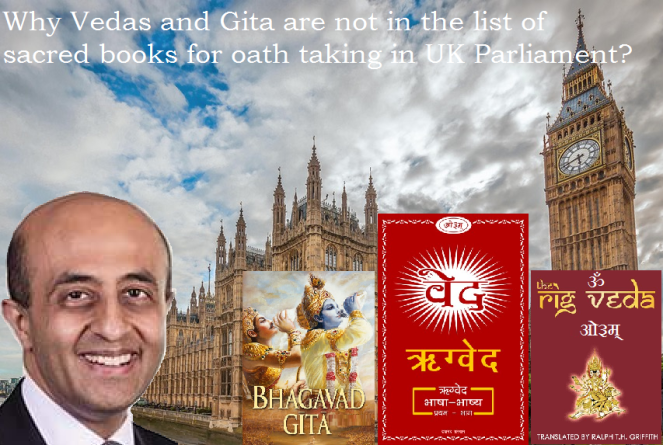Britain’s youngest Indian Parliamentarian Jitesh Gadhia takes Rig Veda to the House of Lords
Why Vedas and Gita are not in the list of sacred books for oath taking in UK Parliament ?

Haridwar : Britain’s newest Indian-origin peer (MP of House of Lords) Jitesh Kishorekumar Gadhia swear his oath on the sacred Hindu book and world’s oldest sacred scripture ‘Rig Veda’ on Tuesday, Sept 13 in London.
Jitesh Gadhia took along his own later edition of the ancient collection of Vedic Sanskrit hymns dating back to around 6,200 BC and has gifted it to the British Parliament.
The copy of the ‘Rig Veda used by him, now Lord Gadhia, was edited in the traditional Devnagari script in 1849 by German academic Max Muller, a well known pioneer of Vedic studies in the West.
At 46, Jitesh Gadhia is currently the youngest Briton of Indian origin in the House of Lords, where the average age of 800 peers is about 69.
An investment banker of repute, Gadhia has been part of some of the largest investment flows between the UK and India and also helped craft Prime Minister Narendra Modi’s speech last November to a full house at Wembley Stadium.
The 167-year-old first edition copy of the Rig Veda that Gadhia will also be gifting to the Parliament has special significance. It was edited and published in 1849 by Max Mueller, the German academic and Indophile who lived and studied for most of his life in Oxford and was one of the pioneers of Sanskrit and Vedic studies in Europe. His compilation of the Rig Veda, in the traditional Devanagari script, was published under the patronage of the East India Company which paid Rs 9 lakh to support to support the effort. Mueller enjoyed a close association with Swami Vivekananda, who he met in London in 1896, and both shared a mutual respect for Ramakrishna Paramahamsa.
“I wanted a copy of the original Sanskrit text but my research took me to Max Mueller and finally my intense search bore fruitful result and I managed to source it from a rare books specialist,” Gadhia told Indian prime news agency PTI, soon after the ceremony that was attended by his extended family, friends and fellow parliamentarian cutting across party lines. Gadhia was accompanied by by his 90-year grandmother Gulabben Gadhia, mother Hansaben and wife Angeli.
It is interesting to note here that the British Parliament does allow only 7 sacred texts without referring any text of Hinduism or Sanatana Dharma!
UK Parliament website shows
“A Table Clerk at the despatch box offers a choice of affirmation or oath cards to read. If the MP wishes to swear on a sacred text, that will be provided. At the Table are:
- the New Testament
- the Old Testament (in English and Hebrew, or in Hebrew)
- the Old and New Testament
- the Koran
- the Granth
- the Welsh Bible
- the Gaelic Bible
Those books which may not be handled by non-believers are kept in slip-cases”.
Here ‘The Granth’ means the Shri Guru Granth Saheb, the living sacred for Sikh sects. Though the Granth is highly honored by the Hindus and the Sanatanis, it is very much heartening to taste the British mentality that did not allow “Vedas”, the primordial sacred scriptures for the Hindus and Sanatanis and “Gita’, the most read holy book culminating the radiant philosophical thoughts and supreme spiritual truths for the human beings for ages.
At this point, Gadhia did a marvelous work by taking oath on Veda and presented it to the British Parliament.
The British Parliament should honor the Vedas and Gita with the enlistment for these two essential sacred books for the Humanity in the list of sacred text for the purpose of oath taking ceremony in British parliament.
Source : Hindu Existence





